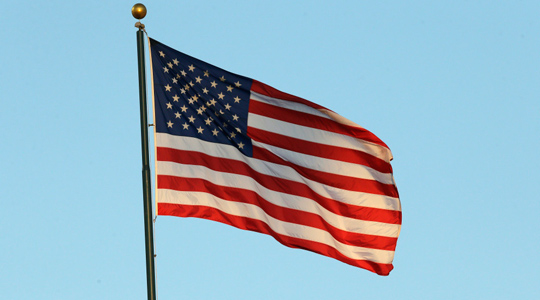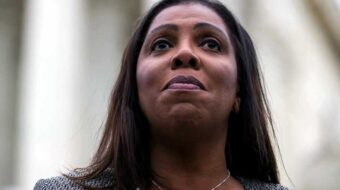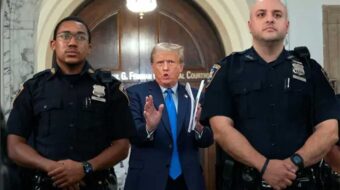
I don’t know about you, but over the last few years I’ve become more aware of patriotic expression in our public life. Sometimes it feels intrusive. I think this new wave began after 9/11. It takes many forms. Remember when they tried to get us to stop saying “French fries” because France didn’t join the coalition of the coerced (oh, sorry, I meant of the willing) in shock-and-awe bombing Iraq for the WMD it didn’t have. Probably no one under 25 even remembers the new-fangled term “freedom fries” that was supposed to slice, dice, and cut the Frenchies.
Of course we all know about the National Security Agency and the mass collection of metadata that’s supposed to keep our country safe from terrorism, but that in reality more serves the corporations gathering information on our spending habits. I was surprised – well, mildly shocked, I admit – a few weeks back when Los Angeles County, for which I volunteer conducting civil marriages (over 300 each year), obliged all of us Deputy Commissioners (read: justices of the peace in many jurisdictions) to get our fingerprints electronically scanned (and instantly available to law enforcement agencies), and sign a release allowing the County to obtain our arrest records. I know that other volunteers for the County work in a number of capacities dealing with children, or perhaps in medical facilities, so I can imagine the usefulness of screening out molesters and druggies. But the wide reach broadly sweeps up all volunteers; so there I was in 2014 actually writing on paper that yes, I was convicted and did time in New Orleans Parish jail back in 1970 for anti-war activity (the charge was public obscenity, said activity involving an inappropriate finger). That was almost half a century ago!
Then there’s the whole military thing. “Thank you for your service,” we’re encouraged to say to anyone in uniform. Speaking for myself, the military adventures of our nation since World War II, the “good war,” have been undistinguished in the annals of liberty, and we really never entirely won any of them anyway. Of course, they weren’t wars, you understand, just “actions” and “operations” with collateral damage. Oh, yes, there was Grenada, we sure showed them a thing or two. Imagine, inviting the Cubans in to help them build a new airport runway! But Korea, Vietnam, Dominican Republic, Afghanistan, Iraq, to name a few? I’m not sure I’m so thankful for that service. Nothing against the individuals personally, mind you; I just think we coulda stayed at home and saved a lot of lives and limbs. That was my patriotism. Trying to save American lives. Halliburton, General Electric, Dow Chemicals, and the rest of the corporate military bandits, now they have a lot to be thankful for! Gosh, could it be that’s why we fight these wars???!!
I’m not unpatriotic. Really, I’m not. I go to many classical music concerts and, being the biographer of two American composers (Marc Blitzstein, Earl Robinson) who often had trouble getting their concert works programmed, I’m acutely aware of the Eurocentrism in most standard venues. I love American music! And I love our multi-racial, multi-cultural population that gives us dance and song and writing and art and cuisine all the way from the gentle Pacific Islands to the wild Alaskan shores to the liberal West Coast, the Big Sky Country, the soul of the South, Midwest industry, and the historic East Coast all the way up to the lobsterful seas of Maine. Not to mention all the immigrant groups, from every part of the world, who have settled here, as my own ancestors did just a couple of generations back, and made this country rich and great.
What a beautiful land! I like sitting in a window seat flying coast-to-coast, viewing the snow-capped Rocky Mountain ridges, the farmlands of the Plains, the bright lights of cities in the urban Northeast, and the gorgeous, sinuous rivers and shining lakes that paint the passing landscape canvas better than any artist could possibly render. To that was I born, to that am I loyal.
I accept hearing “The Star-Spangled Banner” to open the concert season, and maybe to close it as well. Of course there’d be no point arguing against it at each game of our national sport. But lately I’ve been hearing it at every classical concert at the Hollywood Bowl. In fact, just a few weeks ago, quite unexpectedly, at an oldies revue with The Four Preps and The Chordettes. Dutifully, the whole audience stands, places their hands reverently over their hearts, and sings. “Oh, say can you see…the bombs bursting in air?” Then on to the Beethoven, Brahms, and maybe some born-American Bernstein. Or “Mr. Sandman.”
I’ve taken to not standing up for it any more. The music isn’t American anyway – it’s a British drinking song with new lyrics from the War of 1812 period. And what lyrics! I am just not going to ruin my larynx screaming about “the rockets’ red glare.” Not while at the very moment when we are about to enjoy a 100-piece orchestra and a master soloist performing a stirring concerto, half a world away there literally are bursting bombs and rockets dropping from the skies over the hapless people our American leaders have chosen to name our current enemy.
As the late award-winning writer Paul Monette liked to remind us, the United States has the only national anthem in the world that ends with a question: “O say does that star-spangled banner yet wave / O’er the land of the free and the home of the brave?” I don’t even know how I’d answer that question. Do you? I’m not feeling so free these days. And those uniforms sitting in a military bunker in Nevada aiming precision drones down on Afghan wedding parties? In my eyes, not so very brave.
There’s another reason I don’t sing the national anthem. Or recite the Pledge of Allegiance either. And that’s cuz I don’t have to. Court cases have been won over that issue, thanks to the Jehovah’s Witnesses back in the World War II era who objected to swearing allegiance to any other power than God. That was a constitutional victory for every citizen’s civil liberties, for each of us to seriously think about who we owe our allegiance to. I forget if I’ve ever been asked to sign or swear a loyalty oath, but they’re still around, and still used to weed out nonconformists and possible troublemakers. I believe the record is somewhat mixed on that issue, but in some important cases the oath has been thrown out.
I express my allegiance in myriad ways, without needing an obligatory anthem or pledge forced on me at more and more public occasions. I vote, I help to elect candidates to office, I write, volunteer for civic organizations, sing Christmas carols at nursing homes, officiate at low-cost civil marriages, chair my local union chapter, demonstrate with fast-food and Walmart workers for fair wages, and so forth.
My allegiance is not just to my nation, but to the health and welfare of the Earth. When the unmistakable chords of “The Internationale” strike up, I stand. For the working people of the whole world. Capital is international, and so is labor. If the Socialists of England, Germany, France, Italy, Austria, and Russia had kept the spirit of that song in their hearts instead of caving in to their native patriotism, we wouldn’t be commemorating the centennial of World War I today. I stand for the Partisan Hymn also, the World War II song of the Jewish resisters that has become an anthem of liberation for my people: “Because the time for which we’ve yearned will yet appear / And our marching step shall thunder: We are here!”
I feel conflicted at times. Some of the union meetings I attend begin with the Pledge of Allegiance. Do I remain seated? Do I stand? And if I stand, do I recite it? And if I recite it, do I include the 1954 addition of the words “under God” which are so undemocratic, and so offensive to my sense of separation of church and state? Well, honestly, I usually do stand in those situations, just not to make a scene and shift the focus off the agenda of the day. It’s not the time or place to get into a touchy personal debate about my loyalties.
But I liked what John Burton said, presiding at the opening session of the California Democratic Party Convention of 2011, which I attended as a delegate: “Let’s all now recite the Pledge of Allegiance, and when it’s finished, please add ‘Some day.'” Yeah, that I could go for: “with liberty and justice for all some day.”
Photo: Carlos Osorio/AP












Comments